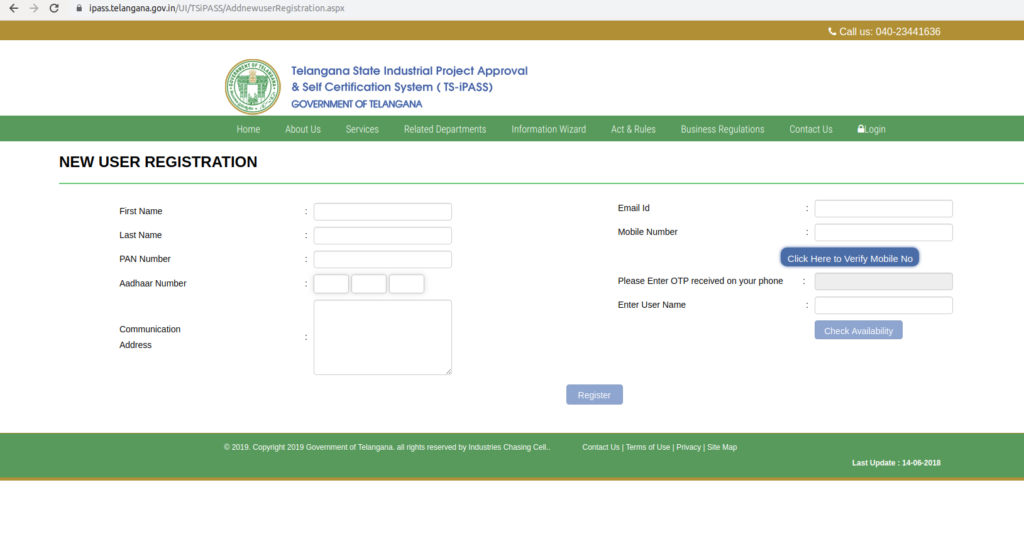Telangana (TS-iPASS)
The Government of Telangana (GoT) passed the Telangana State Industrial Project Approval and Self-Certification System (TS-iPASS) to increase the processing rate of applications related to the various issue of clearances to set up industries. TS-iPASS was introduced through Telangana State Industrial Project Approval and Self-Certification System Act, 2014 (Act No.3 of 2014). The TS-iPASS shall be monitored by the Government of Telangana. TS-iPASS TS-iPASS is a certification system that provides support to industries, services, manufacturing companies in Telangana. It is an online process that helps to clear certification process and permissions within short timelines. TS-iPASS was established with the following features; they are: Eliminating the direct approach Approvals for certification Online payment for certification and clearance to set up industries Quick response to quick queries through feedback and grievance cell Establish Investor facilitation cell to have a single point of contact and to increase the investments Features of TS-iPASS Pre-scrutiny shall be conducted twice a week for the application process All the approval process shall have a single point of approval system by the relevant developments Accepted applications will be referred by District Committees and examined by state-level TS-iPASS committee members Approval for Megaprojects will be issued by self-certification, and the receipt for the self-certification will be received to the applicant within 15 days Provision of penalty if the departments have delayed clearances Secure and progressive regulation for the business environment Services including IT, medical and communication services with relevant infrastructure development Types of Certificates Approved from TS-iPASS Portal Approval certificate from Pollution Control Board for establishing industry( for Red, Green, Orange categories only) Approval of factory plan from the Factory Department Approval of building plan from the Hyderabad Metropolitan Development Authority (HMDA), Directorate of Town and Country Planning (DTCP) and Kakatiya Urban Development Authority (KUDA) Change of land from HMDA Non-Agricultural lands Assessment (NALA) conversion from the Department of Revenue Feasibility for Power from the Department of Telangana State Southern Power Distribution Company Limited (TSSPDCL) No Objection Certificate (NOC) from Gram-Panchayat NOC from the Fire Department Permission from the Department of Metropolitan Water Supply and Sewage Classification of Projects Mega Projects: Investment above Rs.200 crore Other Large Projects: Investments from Rs.10 crore to Rs.200 crore Medium Projects: Investments from Rs.5 to Rs.10 crore Small Projects: Investments from Rs.25 to Rs.25 lakhs Micro Projects: Investments less than Rs.25 lakhs Investment Limits for TS-iPASS The investment for TS-iPASS has been divided into three categories, they are Direct TS-iPASS State TS-iPASS Telangana State Wide Investment Facilitation Board (T-SWIFT) S. No. Jurisdiction Investment Limits 1 Direct TS-iPASS The investments for projects can be up to Rs.5 crore in Plant and Machinery including components and capital expenditure 2 State TS-iPASS The investments for projects can be from Rs.5 crore to rs.200 crore in Plant and Machinery including components and capital expenditure 3 Telangana State Wide Investment Facilitation Board (T-SWIFT0 All investments for megaprojects above Rs.200 crore or with an employment potential of more than 1000 people in Plant and Machinery including components and capital expenditure Time Limit for Processing the Applications S. No. Investment Amount Time Limit 1 For investments in capital expenditure less than Rs.200 crore A maximum time limit of 30 days from the date issuing the acknowledgement 2 For investments in capital expenditure above Rs.200 crore Approval within 15 days. Clearance from the agencies is not required. (except state government) Time Limit for Setting up the Industry If the land allotted for the company has been provided by TSIIC or any other government agency, the company should provide financial closure within one year. The company should have also stated the operations within two years from the date of permission. Companies failing to adhere to the rules should return the land to the government. Documents Required A signed copy of Annexure I Documents related to combined Site Plan Documents related to the building plan Certificate for Incorporation Documents related to HMDA Form B1 and Form B2 (for red category only) Common Application Form (CAF) Application Process Step 1: Click on login to Register with TS-iPASS portal Step 2: Click on ‘New User Registration’ Step 3: Fill all the boxes with relevant details Step 4: Enter the OTP to register with TS-iPASS portal Step 5: After registering with TS-iPASS, the applicant can choose from three options to upload or seek approval for certificates “Entrepreneur Dashboard – CPE (Pre-Establishment Approval)” “Entrepreneur Dashboard – CFO (Pre-Operational Approval)” “Others (Grievance, Incentive, Raw material, Help Desk)” Step 6: Provide the details as required by CPE/CFO Step 7: Fill the questionnaire before filling the common application and make payments Step 8: Fill the boxes with relevant project details Step 9: Submit the questionnaire as per applicable approvals Step 10: Pay the relevant fees as stipulated by each department Step 11: Attach all the necessary documents Step 12: After successful payments for all the departments, the applicant can download the receipt for the payments FAQs Who can apply for approvals through TS-iPASS? Entrepreneurs, business owners, and industrialists looking to set up new industries or expand existing ones in Telangana can apply for approvals through TS-iPASS. It caters to all types of industries, including micro, small, medium, and large enterprises. How does one apply for TS-iPASS? Applicants can apply for TS-iPASS through the official TS-iPASS portal. The process involves registering on the portal, submitting the required documents, filling out the application form, and paying the necessary fees. The portal provides step-by-step guidance for the application process.
Telangana (TS-iPASS) Read More »



